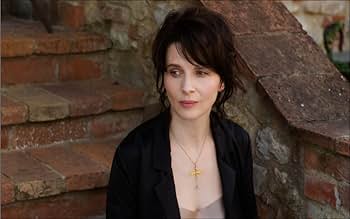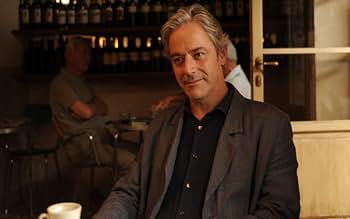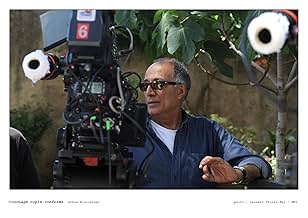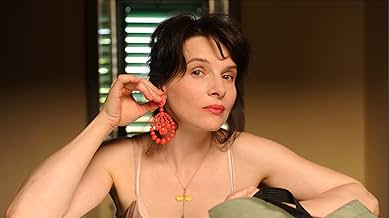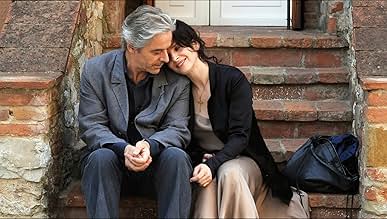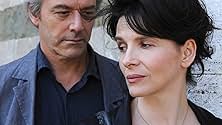Auf einer Lesereise durch die Toskana trifft ein britischer Autor in mittleren Jahren eine Französin, die ihn in das Dorf Lucignano führt. Dort enthüllt eine zufällige Frage einen tieferen Z... Alles lesenAuf einer Lesereise durch die Toskana trifft ein britischer Autor in mittleren Jahren eine Französin, die ihn in das Dorf Lucignano führt. Dort enthüllt eine zufällige Frage einen tieferen Zusammenhang.Auf einer Lesereise durch die Toskana trifft ein britischer Autor in mittleren Jahren eine Französin, die ihn in das Dorf Lucignano führt. Dort enthüllt eine zufällige Frage einen tieferen Zusammenhang.
- Regie
- Drehbuch
- Hauptbesetzung
- Auszeichnungen
- 11 Gewinne & 29 Nominierungen insgesamt
- Le marié
- (as Filippo Troiano)
- La mariée
- (as Manuela Balsinelli)
Empfohlene Bewertungen
The film forces us to wonder to what extent the relationship between the two central characters is real, or an imitation of a once real relationship. It asks is a real relationship any better than a certified copy i.e a fake relationship where both parties pretend it is real. That is the central question - the value of the authentic versus the value of the fake.
Not entirely convincing, but an excoriating watch nonetheless. When this film was finished, I felt like I had just witnessed an entire relationship, from the first fruitful seeds, to infatuation and love and friction and wear and decay, and in a sense I had because that is essentially what the two characters of the film take us through. The film begins with William Shimell, playing the role of modest and charming British academic who is promoting his book in Italy. The idea of this book gives the film its title and what the whole film begins to play around with: the copy. The copy, and it's relation to the original, its authenticity, and whether one should invest any time in an original if a recreation is believable. He would answer 'no' to that last thought. Juliette Binoche appears at his speech, leaves his translator a note, and the next day he appears at her small museum/exhibition/trinket shop, artistic debate is continued, and thus their journey begins. The boundaries of conversation between two people who are seemingly strangers soon dissolves and they are soon fluctuating between moments of bitterness, delight and contemplation, and soon enough in what appears to be a bizarre role-play, the assume the role of a married couple and any façade that they try to wear is soon being flayed.
Binoche is utterly captivating and her award for Best Actress at Cannes is entirely deserved. She is seemingly inexhaustible, communicating in Italian, French and English and losing no degree of vulnerability, bitterness or magnetism between the languages, and she has a remarkable way of kind of softly inhabiting any given situation but being able to turn caustic and uncomfortable with immediacy. There are moments when the characters are sitting opposite each other in conversation and they are speaking directly into the camera, and when Binoche does this it's never less than transfixing.
Shimmel, for a first time actor is for the most part quite grounded and reserved, but it's with him that the film often feels at its flattest. He's the more outwardly ruminating intellectual, always approaching things with a contemplative thought, and it often feels like the film is struggling to maintain a deep thought, as if in fear of being mocked for being nothing less than poetic. Maybe that's the way the character is supposed to be, but all his affectations get tiring. He comments on Eucalyptus trees being so totally unique, how each one has its own shape and definition and being unlike the other one, and as truthful as it might be, it's just a comment that leaves you thinking 'And?' At other times the exchanges of these characters are scintillating, as when an innocuous pit-stop at a café becomes changes the gears of their relationship, and Binoche begins to furiously criticise his cool, charming bullshit-masquerade. The dialogue operates in these two modes, between fascinating and questionable, but never really finds its footing.
Abbas Kiarostami is clearly a man who knows exactly what he wants to do and how to do it, and at the jolly age of 74 all the wisdom and joy and despair he must have accumulated in his lifetime can be felt here, in the vivaciousness and the bitterness of the characters, in the way a camera can just sit and stay trained for minutes on end and let the people unfurl themselves, but sometimes it feels like all he is trying to much to do justice to all his collected experience in life. There's a shot toward the end with our couple standing in a courtyard together and just in front of them is a far older couple, man and wife, standing on the same side of each other, tentatively walking and supporting each other. The imagery is obvious but the connotations are beautiful, and it's the sort of a shot that could only have worked as aposiopesis to the journey preceding it. (Maybe that is the point)
So there was an ambivalence I felt throughout the film, but it's hard to dismiss something this lovingly made, as an expression of the melancholy of our relationships in life. There's a blustery and picturesque feel throughout this Italian journey that is hard to argue with.
He comes to her antique shop and invites her to drive around. However, she takes James to the village of Lucignano. While they are traveling, he autographs six books she had bought and they discuss the subject of his book. When they arrive in the village, they are mistakenly taken as husband and wife and the woman decides to play the game and soon the bitter James Miller assumes the role of her husband.
I am not a fan of Abbas Kiarostami, but I see his movies since they are usually challenging and open to interpretations. I have just seen "Copie Conforme" on DVD and I have my understanding of the story that may be or may be not the real intention of this Iranian writer / director.
Juliette Binoche's character definitely knows James Miller and there are evidences: first, she has a reserved spot in his lecture; then her son comments that she had decided to fall in love with the British writer; last, when James arrives in her antique shop, they do not introduce themselves to each other and they are not too formal as strangers certainly would be.
I believe that James Miller first met her years ago while she was walking on street with her son following her but never together. She probably would be a single mother with rejection to her son and on that occasion they might have become lovers or they had at least a love affair in the hotel that they visit in the end but James probably would be married.
They travel to the romantic village of Lucignano and they have a long discussion about copies and originals art works. When the owner of the cafeteria believes that they are married, the French woman plays games with James Miller pretending that they have been married for fifteen years, probably because she might have wanted to be his wife in the past. In the end, there is a parallel with the central subject of the story, copies vs. originals, and the drama turns into a faithful copy of a romantic comedy with a long-term marriage. My vote is seven.
Title (Brazil):"Cópia Fiel ("Faithful Copy")
It has originality - it will not be like other films seen recently in mainstream European cinema, there is little or no plot, or action, rather we dealing with conversation, and the state of the heart and the mind in a fiercely non-Hollywood fashion. This is a film about thinking about emotions, and is almost non-linear in its conversations and if that concept doesn't appeal then it may well not be viewable.
It is, however, despite itself, pretty mesmerizing - what will they say next? what other aspect of why relationships fail and succeed will be tossed into the salad? who are they? why the games? etc;
The conversations are both alienating and intimate, and have a "play-acting" aspect that allows the psychosexual aspect of how we adults explore potentiality to be examined in a way that is normally reduced to sexual tension and flirting on film. This is a film that demands attention - this is not dumb film-making. I recognize the conversations and the feeling well, but in a sense the connection is too contrived to be really successful - but it certainly touches that part of intimacy that is normally, at best, ethereal.
The setting of Chianti and a beautiful hot summer day, with cicadas and a wonderful small town to explore, lightens this - but it remains a film for philosopher romantics. It is, as others here have noted in better ways than me, film as film - here there are images and shots that work to compliment the alienation and solipsistic nature of the two leads.
A film about questions that offers few answers, it is certainly intriguing and if you are into human exploration and condition worth the effort to watch.
Wusstest du schon
- WissenswertesDuring a visit in Tehran by Juliette Binoche, Abbas Kiarostami told Binoche the synopsis of Certified Copy as a casual anecdote, which she said that she fully believed until he confessed to having made it up. According to Kiarostami, studying the reactions of Binoche as she listened to the story was a vital part of the film's further development.
- Zitate
James Miller: It seems to me that the human race is the only species who have forgotten the whole purpose of life, the whole meaning of existence is to have fun, to have pleasure. And here is someone who's found their own way to do it. We shouldn't judge them for it. If they're happy and enjoying life, we should congratulate them, not criticize them.
- VerbindungenFeatured in Breakfast: Folge vom 31. August 2010 (2010)
- SoundtracksO surdato 'nnamurrato
Written by Aniello Califano (as A. Califano) and the music by Enrico Cannio (as E. Cannio)
Top-Auswahl
- How long is Certified Copy?Powered by Alexa
Details
- Erscheinungsdatum
- Herkunftsländer
- Offizielle Standorte
- Sprachen
- Auch bekannt als
- Certified Copy
- Drehorte
- Produktionsfirmen
- Weitere beteiligte Unternehmen bei IMDbPro anzeigen
Box Office
- Budget
- 7.000.000 € (geschätzt)
- Bruttoertrag in den USA und Kanada
- 1.373.975 $
- Eröffnungswochenende in den USA und in Kanada
- 77.937 $
- 13. März 2011
- Weltweiter Bruttoertrag
- 7.736.632 $
- Laufzeit
- 1 Std. 46 Min.(106 min)
- Farbe
- Sound-Mix
- Seitenverhältnis
- 1.85 : 1




